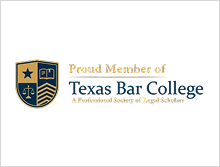Justin Wilson
Senior Attorney
We Offer Complimentary Consultations
If you are facing DWI, assault, sex crime, or other criminal charges, get in touch with My Dallas Criminal Lawyer to learn about your legal options.

My Dallas Criminal Lawyer » Probation Revocations
After a conviction in Dallas, you may have to serve a term of probation that requires you to follow specific conditions and restrictions. Violating the terms of your probation can have serious consequences, as the court may revoke your probation and require you to serve a jail or prison term. If this happens, you need dedicated, persuasive legal counsel who can help you defend your interests and advocate on your behalf when you face a probation revocation hearing.
AWARDS AND ACHIEVEMENTS









When police or probation officers accuse you of violating the terms of your probation, you need experienced, dedicated legal counsel to protect your rights and freedom. Choose a criminal defense lawyer at My Dallas Criminal Lawyer to advocate for your interests in a probation revocation hearing because:

A defendant serving probation, also called community supervision, may have their probation revoked for violating its terms as set by the court that entered the judgment of sentence on the defendant’s criminal conviction. Violations of community supervision fall into two categories: technical and substantive.
A technical violation refers to any violation of a specific term of community supervision that does not involve the commission of a new criminal offense. Common examples of technical violations of community supervision include:
A substantive violation can occur when a defendant on community supervision commits a new criminal offense, as the standard terms of community supervision require defendants to refrain from committing new crimes. Violations of community supervision can involve both technical and substantive violations, such as when a defendant fails a drug test, which may serve as evidence of unlawful possession of controlled substances.
Under Texas law, a court may issue a warrant against a person serving community supervision for violating any condition of their community supervision, ordering them arrested and detained pending a determination of whether the probationer has violated a condition of their community supervision. Alternatively, a supervision officer, police officer, or other officer with the power of arrest may arrest a defendant with or without a warrant on the order of the trial court.
A defendant arrested for a probation violation must receive an initial hearing within 48 hours of arrest, with the judge who ordered the defendant’s arrest empowered to authorize the defendant’s release on bail. If a defendant does not get released on bail, they can file a motion to request a hearing before the judge who ordered the defendant’s arrest.
A court may revoke the community supervision of an incarcerated defendant if the defendant, in writing before a court of record or notary public, waives their right to a hearing and counsel, affirms they have nothing to say as to their sentence, and requests the revocation of their community supervision.
Additionally, a court may not revoke a defendant’s community supervision if, at a revocation hearing, the court finds that only the uncorroborated results of a polygraph exam support the alleged violations. Furthermore, when an alleged violation involves the failure to pay community supervision fees or court costs, the state must prove by a preponderance of the evidence that the defendant could pay such fees or costs.
Finally, a court can revoke a defendant’s community supervision when the state proves by a preponderance of the evidence that the defendant violated one or more conditions of their community supervision.
Common questions that clients have about probation revocation include:
When you allegedly commit a substantive violation of your community supervision, prosecutors can choose to bring additional criminal charges for the new alleged offense in addition to pursuing revocation of your probation. As a result, a substantive violation may have significant consequences as you could face an additional criminal sentence on top of your original sentence if the court revokes your community service and you get convicted on new criminal charges.
Defendants who have their community supervision revoked can appeal the revocation to the Texas appellate courts to assert a violation of procedural or substantive due process rights or to challenge a legal error by the trial court or the sufficiency of the evidence supporting the finding of a violation.
When a supervision officer or the police accuse you of violating the terms of your probation, an experienced criminal defense attorney can help you defend your interests and future from the possibility of consequences from revocation of probation. Call My Dallas Criminal Lawyer today at 214-949-4117 for a confidential consultation to learn more about how we can help.
Collin County
August 2025
Acquitted
Driving While Intoxicated Jury Trial
Collin County
August 2025
Dismissed
Second-Degree Felony Sexual Assault of a Child
Ellis County
August 2025
Dismissed
Assault Causes Bodily Injury to a Family Member
Collin County
August 2025
Felony Reduced
State Jail Felony DWI with Child Reduced to Misdemeanor
Denton County
July 2025
NO-BILL
3 Counts of Manslaughter & 3 Counts of Aggravated Assault with a Deadly Weapon
Dallas County
June 2025
Dismissed
Second-Degree Felony Aggravated Assault with Deadly Weapon
Denton County
June 2025
Felony No-Billed & Motion to Revoke Withdrawn
State Jail Felony Injury to Elderly & Motion to Revoke Misdemeanor Probation
Dallas County
May 2025
Deferred Adjudication
Second-Degree Felony Aggravated Assault w/Deadly Weapon Reduced to Class A Misdemeanor Discharge of Firearm in Certain Municipalities
Thomas A.
Justin Wilson and Justin Harris were amazing. Highly recommend them.
Lybbie
I trust Justin for any legal related questions and he certainly delivers. I recommend him 100% as he is committed to you from start to end- no matter the situation.
Cristal D.
Absolutely the best team you could ask for. From start to finish, the entire office was professional, compassionate, and truly dedicated. They made me feel heard, respected, and confident during one of the most stressful times of my life. Their communication was consistent, and you can tell they genuinely care about their clients and their outcomes.
If you’re looking for a lawyer who is sharp, honest, and will fight for you like it’s personal – this is the team you want on your side. I can’t thank them enough for everything they did. They truly are the best in the business.
Natalie M.
Justin Harris was an exceptional lawyer- he is hardworking and dedicated and will reach your needs and more.
He was reliable and professional in every way. He makes sure that you are not only heard but seen. When working with Justin- it gave me strong trust that he cared and that he is a man of his word.
Highly recommend this law firm. Justin and the team handled my case with the upmost care, always kind and professional, and let me know all the details every step of the way.
Prof. Carlos R.
My first impression with Justin and Heidi was that they are a first class law firm, very professional and very open to answering questions and making a person feel appreciated. I am glad I met both at Formation in Frisco Texas.
Alex C.
I have come to know Justin and his team through my practice as a civil lawyer, and Justin has always impressed me with the way he treats his clients, and his ability to clearly explain options. He works tirelessly to be prepared for all his cases, and always treats others with professionalism and respect.
Joshua J.
Justin is a super professional lawyer with positive results. I would refer Justin to any one who needs help with anything. Justin gets it done with positive results.
Yoker V.
I highly recommend Justin 100%, the total positive experience started the moment we first spoke. Justin is a complete and total professional and a highly skilled lawyer outside and especially inside the courtroom. My case had its challenges but Justin skillfully did his research and presented the court and jury a master class. At the end of trial the judge looked at prosecutor and said ” that’s how its done” YLV
Donna D.
Knowledgeable, patient, listened to what my situation needed. Impressed with my Attorney and his service.
Mukesh K.
I have absolutely no hesitation in declaring that Justin is one of the finest attorneys you will ever find to represent your case most effectively yet very ethically. He is extremely professional and very deliberate in his advice and charting the right course of action appropriate for the situation. I used him for a DUI case and cant stress enough how much trust he developed in me and got the best outcome possible for me by getting the case dismissed. Good luck to the reader. Go with Justin.
| Our team is available by phone 24/7 | Office Hours |
|---|---|
| Monday | 8AM – 5PM |
| Tuesday | 8AM – 5PM |
| Wednesday | 8AM – 5PM |
| Thursday | 8AM – 5PM |
| Friday | 8AM – 5PM |
| Saturday | Closed |
| Sunday | Closed |
| Our team is available by phone 24/7 | Office Hours |
|---|---|
| Monday | 8AM – 5PM |
| Tuesday | 8AM – 5PM |
| Wednesday | 8AM – 5PM |
| Thursday | 8AM – 5PM |
| Friday | 8AM – 5PM |
| Saturday | Closed |
| Sunday | Closed |
| Our team is available by phone 24/7 | Office Hours |
|---|---|
| Monday | 8AM – 5PM |
| Tuesday | 8AM – 5PM |
| Wednesday | 8AM – 5PM |
| Thursday | 8AM – 5PM |
| Friday | 8AM – 5PM |
| Saturday | Closed |
| Sunday | Closed |